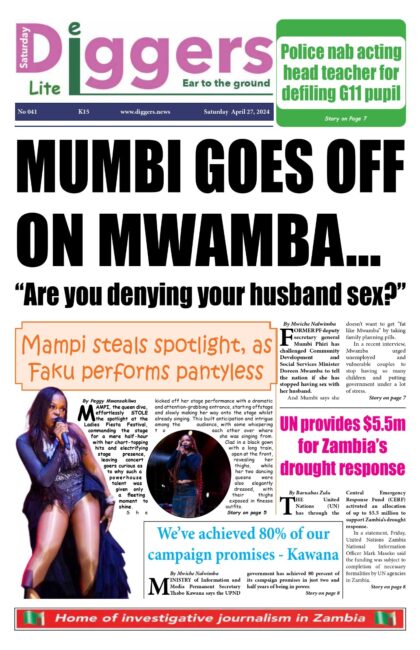The Zambian currency, currently trading at what are record lows, is amongst the worst performing currencies in the world. However undesirable a weak currency may be, it is not entirely a bad thing. It does have its benefits. It may surprise you to note that a very strong currency is not as beneficial as you may think it is. For some countries the benefits of a devalued currency actually outweigh those of a very strong one. Amongst the economies where the local unit is deliberately weakened is that of the People’s Republic of China. Why then do countries desire to have weak currencies? I will endeavor to shed more light.
In economic circles there exists what is referred to as the Dutch disease. This is where a country’s currency is so strong, it begins to affect sectors such as Manufacturing. Often this comes as a result of a booming resource sector. Due to the influx of forex, a currency appreciates, which has the unintended consequence of making value added exports more expensive. Our neighbor, Botswana, though handling this very well, has faced challenges with this predicament. As a consequence, Manufacturing continues to play a minimal role in that economy, which continues to be dominated by diamond mining.
As I have already alluded to, a weak currency makes exports more competitive. Let me provide an example. Say today 1 US Dollar costs ZMW 20 and a week later the same 1 USD costs ZMW 30. What this means is that the holder of the Dollar will get more Kwachas for the same amount of US Dollars. With these increased Kwachas, he/she is able to buy more Zambian goods, because in terms of the Kwacha, his dollar is worth more. If we look at it on a macro scale, Zambian goods become cheaper to the foreign buyer. This in itself has the potential to increase the volume of our exports and improve our trade position.
Secondly, a weak currency discourages imports. Borrowing from the above example, when the Kwacha weakens, importers require more Kwachas to purchase the same quantity of goods. What this means is that goods that come in from beyond our borders will be relatively more expensive than those that are produced domestically. In such a scenario, consumers will tend to opt for the domestically produced goods, because they are cheaper.
Allow me to make a note on the nature of the Zambian economy, which is overly import dependent. We import too much as a country. Unfortunately, even what we do produce is heavily reliant on foreign raw materials and intermediate goods. This is unsustainable. It is not good for our economy neither is it for economic fundamentals such as the exchange rate. In most instances, a domestic manufacturer will need to import 70-80% of their inputs. It is quite challenging, almost impossible, to have a healthy exchange rate in such a scenario. We Manufacturer very little. Furthermore, what we do produce, constitutes a miniscule portion of our consumption. Cars, electronics, textiles and much more come through our borders. And not that we do not have the capacity to Manufacture, it is simply a lot easier to let citizens of another country do the hard lifting.
What then must we learn from the plummeting value of the Kwacha? I feel this is an opportunity to change the makeup of our economy. There needs to be a paradigm shift; as consumers we need to believe more in the quality of goods that are manufactured by our fellow Zambians. For the Manufacturers, there is a need to source the bulk of raw materials domestically. Also we need to stretch our capacities. Why can’t we produce automobiles? Why can’t we manufacturer smartphones? Our level of Manufacturing must progress beyond the basic forms we are accustomed to, towards the more complex. We have done this before. We used to Manufacturer vehicles; the famous Fiat for which a plant existed in Livingstone, stands out. This shall be the lasting solution to our currency woes.
The weakened Kwacha provides an opportunity for just this. At this moment, imports are costly whilst domestic goods are relatively cheaper. At the same time our exports are more competitive. Whilst the majority of Manufacturers are lamenting the weak currency, I would hope their attentions would be shifted to the potential within the present moment. In the competitive geo- landscape, a weak Kwacha means foreign buyers get more value for money on Zambian products than for our neighbours in the region whose currencies are stronger. Beyond Manufacturing this scenario holds promise for the metals, tourism and other sectors.
In conclusion, the best opportunities are usually inherent within the most undesirable of situations. My plea is that Zambian entrepreneurs will see the advantages presented by the weakening of the Kwacha, opportunities to serve more than just the domestic market and tap into the external. A strong currency may not be on the cards in the short term. We must therefore begin to conceptualize how, as Zambians, we can maximize on the present moment, and believe me, there are ways to do so. Robert Kiyosaki is fond of making reference to how the times to make the most money are in a period of recession. In the same vein, opportunities abound for Zambian Manufacturing, Zambian Manufacturers to make swaths of money. I hope this write up will peak our collective interest, so that rather than mulling the moment, we may see the silver lining and advance ourselves and our economy towards the goals we have set for our nation and our people.
The Author is an Economist













9 Responses
Based on this logic, our neighbour Zimbabwe has been poised for tremendous success for several years now.
You are just writing to justify the UPND failures period.
The weakening of the currency in a country wher no meaningful economic activity is happening is serious cause for worry.
So lets not hunt for justifications, we need not be economists to understand that we are in dire straights.
I see one benefit with sub-categories… otherwise this view is too narrow…
Coming from an economics he\she should understand that what oils an economy is oil which we don’t produce and have to be bolasught with dollars so according to the artical the two don’t related truly a very narrow view.
This is such a narrow view of looking at this….
As alread stated in this article we import 70%-80% of raw materials,this makes it impossible to sell local products cheaper than imported products.Bulbs domestically made are expensive compared to chinese bulbs.
I have learned a simple definition of inflation thru your analysis.thank u comrade.
The author is very correct but l have already seen negative rebuttals from narrow minded zambians who most likely skipped an economics class & have no clue about fiscal or monetary economics.
For them l say stay in your lane & buy locally produced goods. You will be OK. Leave imported goods to people who understand economics & have money.
There are no benefits to anyone at the moment but only to those individuals who are getting bribes and hiding the loot in foreign countries. Tell them to bring the dollars they’re getting from their accomplices and invest back here. What are they scared of?
What you’ve proposed can only be attainable in not less 10yrs. Who wiil invest in an uncertain economic environment like ours at the moment? Such a one will have to wait for a long time to recupe their investment.